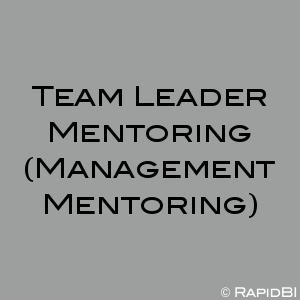 Using Mentoring to Effectively Develop Team Leaders
Using Mentoring to Effectively Develop Team Leaders
Team leader and middle management mentoring is rapidly becoming the “must have” in replacing conventional and costly internal training programmes.
With the changing economic climate presenting new challenges every day, many middle managers lack the skills and experience to make informed decisions. Worse – much of the management development over the past 10 years has focused on systems and growth, not survival and sustainability, certainly not problem solving. One solution to this development gap is the use of external experienced managers as mentors to your managers. This is proving to be a cost effective solution for financially astute organisations for manager of all levels and experiences.
The basic principle of management mentoring
These programmes are not optional. Employees (Team leaders, Supervisors and Middle Managers) are advised they will be given a mentor and are obliged to accept. While some will resist, most are happy to embrace the concept and evidence shows that the mentee, the mentee’s immediate superior and the overall company benefit from these programmes. Meetings take place every 2-4 weeks depending on the needs of the organisation.
External mentors visit the company three or four times a month and mentor up to five managers on each visit. It gives the executive an opportunity to discuss issues with an external person and to bounce ideas off someone who has no axe to grind and can give objective advice and guidance.
As well as the fortnightly or monthly one to ones, the mentors are also available to their mentees on the phone and email at other times. This allows the mentee to always be supported.
All meetings are confidential, and apart for confirming attendance, no feedback is given (unless specifically agreed in advanced). This ensures the managers talk openly with the mentor. Any generic or common needs will be highlighted to the sponsoring director or executive, for consideration as an organisational wide development need.
It is important to stress that this is not executive coaching. The staff are mentored by professional mentors who are themselves business people, many of who are non-executive directors as well as specialist consultants. The mentor teams are put together to offer a vast reservoir of knowledge, experience and expertise.
Expertise in management mentoring
For this to work the external mentors need to be experienced and credible. They need to have considerable experience as both line managers and business managers, with proven expertise and competence in mentoring and at least 4 of the following:
- Strategy & business planning
- Finance (operational and strategic)
- Marketing (operational and strategic)
- Operations (operational and strategic)
- HR (operational and strategic)
- IT (operational and strategic)
Knowledge of management mentors
As times and trading conditions change, so does the need of the mentor. Having experience to draw upon, rather than just text books is increasingly important. For many in management positions – especially those that have spent their entire career in public or large corporate positions, they have relied on function to undertake activity. The world is changing, and increasingly organisations require the adaptability of people that have developed and grown small and medium sized organisations – where dealing with diverse issues was order of the day. In other words we need mentors with 20-40 years experience rather than those with 1-10 years. The recent business challenges (loss of jobs, financial constraints etc pose problems to less experienced managers and mentors – but these challenges are not new, and we can learn from the way these situations (or ones like them) were handled in the past.
Recent reports from the CIPD show that experienced managers are losing out in obtaining employment. The irony is that it is often just this experience that organisations need to support their up and coming younger managers. An effective mentor needs to have worked in a diverse range of sectors, in varying roles and had experience of passing or transferring knowledge effectively.
The management mentoring cost from £3000 per person per annum whereas a typical coaching programmes can cost upwards of £7000 per person. Coaching will often lead to identifying additional training needs for an individual, where as mentoring can often provide that training as part of the on going relationship.
Want to learn more about management and Team leaders mentoring?
If you are interested in this cost effective manager development strategy, please contact a member of the RapidBI team for a discussion.

Team Leader Mentoring (Management Mentoring)


 Annemiek Stolk says
Annemiek Stolk says
17/09/2012 at 16:10Team Leader Mentoring (Management Mentoring) http://t.co/eh6TOi4Q via @247tweet #leadership #teamdevelopment
 Mike says
Mike says
31/03/2010 at 15:04Blog article on Business Mentoring as a management development approach http://bit.ly/9kxDxQ
 Mike says
Mike says
31/03/2010 at 14:09New Blog post: Team Leader Mentoring: Training managers is difficult and expensive, but it does not have to be tha… http://bit.ly/9gYniH